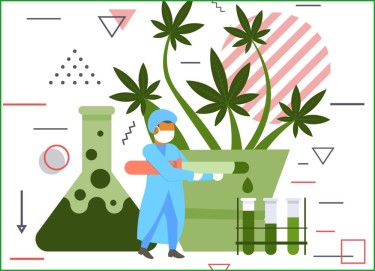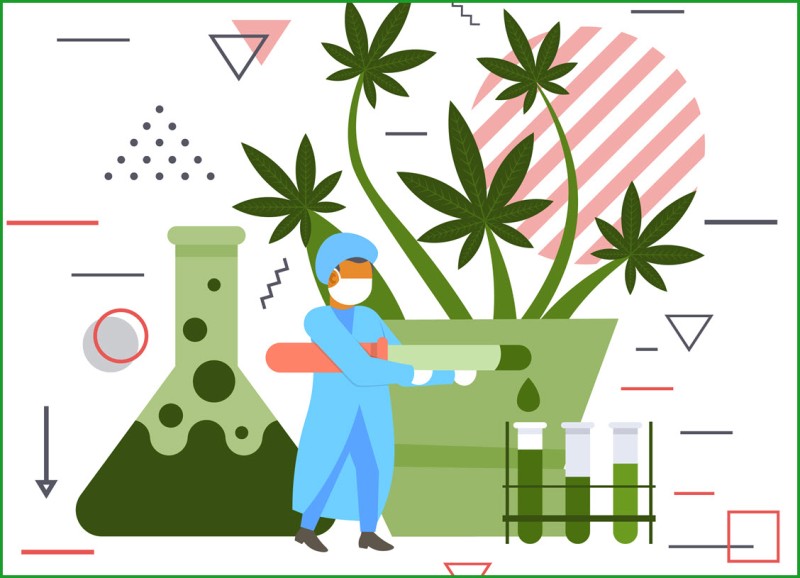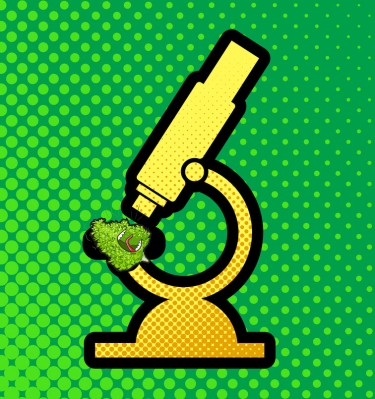
Cannabis quality testing is required in all countries where legalization has occurred.
Lab testing is an essential component of the cannabis legal landscape. Any cannabis product purchased from a licensed facility must now pass a battery of tests performed by a state-accredited lab. These tests aid in ensuring that items are safe to ingest and simple to dose.
Lab testing primarily looks for THC and CBD strength and levels, residual pesticides, undesirable pollutants, and the presence of mycotoxins such as mold and mildew. Further tests can be conducted to determine terpene concentration, although they are not required. Each test necessitates the use of specialized equipment and methods, which must be carried out by specialists who have been thoroughly trained and licensed.
COMPLIANCE DATA
The cannabis lab testing sector is primarily concerned with compliance data—all of the testing methods defined by a state's regulatory authority that must be done on a cannabis product before it can be distributed or sold. When a cannabis product "meets compliance," it indicates it complies with the state's pesticide, contaminant, mold, and mildew criteria.
To generate the data necessary by each state's regulatory agency, accredited laboratories must employ correct analytical methodologies. Most laboratories perform a core set of tests, but there is no global standard, and each state has its own standards.
Laboratories are typically third-party firms that must go through an accreditation program and present compliance data to the regulatory body in their jurisdiction. Cannabis manufacturers require this compliance information so that their goods can be lawfully sold and distributed.
Laboratory accreditation is essential because it assures that facilities have enough testing equipment. as well as that technicians have received adequate education and training. Well trained chemists and microbiologists who are professionals in analytical chromatography are among those included.
LACK OF STANDARDIZATION
According to industry sources, one of the issues facing the cannabis testing sector is a lack of standards, which is endangering customer confidence in cannabis products and making it difficult for some testing organizations to function.
But, testing lab professionals and regulators argue that the problems do not end there.
According to industry officials, several marijuana businesses, such as growers, processors, and manufacturers, are looking for labs that will provide the results they require in terms of THC potency and impurities.
Some cannabis businesses are alleged to be turning in samples of their marijuana that have been tainted with spray-on cannabis oil or coated with THC crystals to give the appearance of a higher THC level, among other things.
Meanwhile, regulators are shutting down testing facilities for allegedly reporting the results that do not match audits.
The Washington State Liquor and Cannabis Board (LCB) suspended Praxis Laboratory's license for allegedly manipulating testing results on over 1,200 cannabis samples by reporting greater THC levels than tests revealed.
As of now, the Centralia, Washington-based lab has been suspended. State inspectors will seek to permanently cancel the lab's license while it is closed.
"Throughout the investigation, the lab owner sought to remove evidence of false data in an effort to obstruct (the agency's) capacity to conduct a comprehensive investigation," according to an LCB release.
In a statement to Marijuana Business Daily, Praxis stated that the LCB's decision was "in mistake and based on erroneous information." The lab is appealing the decision.
In a separate message distributed on social media to the Washington state cannabis community, the company stated, "This is a clear-cut instance of agency overreach and libel, and we will be taking legal action immediately."
According to the statement, a disgruntled former employee took data from the facility and then informed the regulators.
Cannabis labs have been closed down by regulators in other countries due to faulty or deceptive test results.
TESTING FOR MORE THAN JUST THC
THC (tetrahydrocannabinol) is the most widely recognized cannabinoid in cannabis, but it is not the only one that counts. Although CBD (cannabidiol) and other cannabinoids may have health advantages of their own, many regulatory agencies only demand to test for THC concentration.
Cannabis products must pass a number of tests in order to be compliant. Potency Test. When it comes to dosing, precise potency labeling on marijuana products is critical. Potency testing determines how much CBD and THC are present in a specific product and can be offered in a variety of formats.
Testing for Contaminants. Cannabis products pass through numerous hands before reaching the commercial shelf, and contaminants might enter from a number of sources.
Contaminants that are chemical in nature. Plants can be subjected to a variety of pesticides and other substances, such as artificial growth hormones, during cultivation, which might be harmful if consumed. State regulatory authorities have lists of banned pesticides and products must be free of these in order to fulfill compliance and make it to the dispensary.
Because solvents are introduced during the extraction process for some concentrates and extracts, residual solvents such as butane, xylene, and ethanol must be tested. Minimal amounts of residual solvents are permitted in a product, but not in excess. These levels differ from one state to the next.
Contaminants caused by microorganisms. Water and microbiological pollutants are inextricably linked. The presence of mycotoxins in cannabis, such as fungi, mold, and mildew, can be deadly if consumed, especially for persons who have pre-existing medical issues or a damaged immune system.
Microbial contamination is mostly a problem during production, but it can also arise during handling and packaging due to personnel hygiene. Although mold and fungus are the main concerns, germs like Salmonella and E. Coli can also be present and are hazardous if consumed.
BOTTOM LINE
The cannabis industry relies heavily on lab testing to make sure that its products are safe to consume and adhere to legal requirements. Nonetheless, there are questions about the precision and dependability of test results because to the absence of standards and the possibility of manipulation by some cannabis enterprises. While THC potency is frequently the main focus of testing, it's crucial to check for contaminants, including chemical and microbiological ones, to make sure that products are safe for users. The industry's ability to improve the legitimacy and dependability of cannabis testing will ultimately depend on overcoming these problems and developing greater standards.
CANNABIS LABS, READ ON...
THE END OF INFLATED THC NUMBERS AT LABS, REGULATORS CRACK DOWN!






